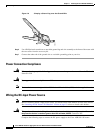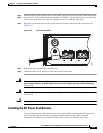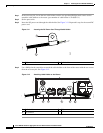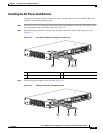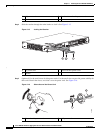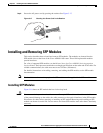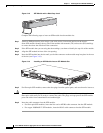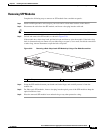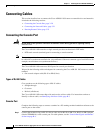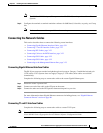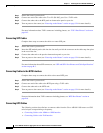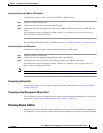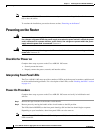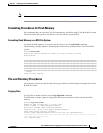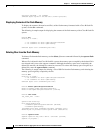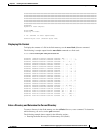
3-20
Cisco ASR 901 10G Series Aggregation Services Router Hardware Installation Guide
OL-28105-02
Chapter 3 Installing the Cisco ASR 901 10G Router
Connecting Cables
Connecting Cables
This section describes how to connect the Cisco ASR 901 10G router to external devices and networks.
It includes the following sections:
• Connecting the Console Port, page 3-20
• Connecting the Network Cables, page 3-21
• Dressing Router Cables, page 3-23
Connecting the Console Port
Warning
Do not work on the system or connect or disconnect cables during periods of lightning activity.
Statement 1001
The Cisco ASR 901 10G router has a single console port that can function in DTE mode:
• DTE-mode console (terminal) port for connecting a console terminal
Note The console port functions are asynchronous serial ports; any devices connected to the console port must
be cabled for asynchronous transmission. (Asynchronous is the most common type of serial device; for
example, most modems are asynchronous devices.)
The Cisco ASR 901 10G router uses RJ-45 ports for console port function.
We provide the following cables and adapters for connecting the Cisco ASR 901 10G router to a console
terminal:
• One console adapter cable (RJ-45-to-DB-9, blue)
Types of RJ-45 Cables
Cisco products use the following types of RJ-45 cables:
• Straight-through
• Crossover
• Rolled (or Rollover)
The Cisco ASR 901 10G router ships with and uses the rollover cable. For instructions on how to
identify a rollover cable, see Identifying a Rollover Cable, page B-5.
Console Port
Complete the following steps to connect a terminal or a PC running terminal emulation software to the
console port on the router:
Step 1 Connect the terminal using an RJ-45 rollover cable and an RJ-45-to-DB-25 or RJ-45-to-DB-9 adapter
(labeled TERMINAL) to the console port. For cable pinouts, see the “Console Port Signals and Pinouts”
section on page B-4.



